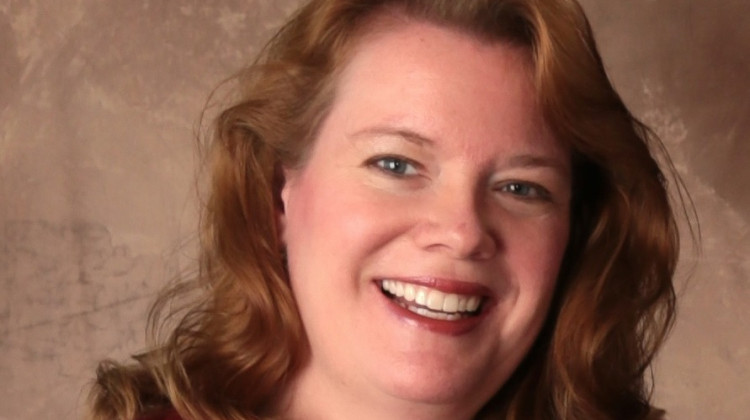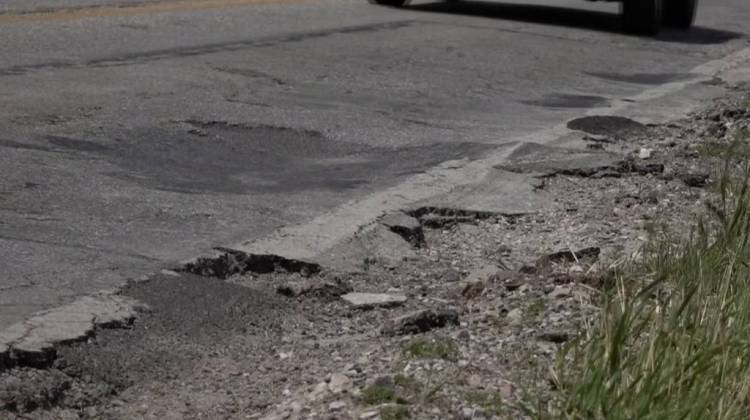
DCS Director Terry Stigdon and Gov. Eric Holcomb talk with the media after the release of an independent report on the agency in June 2018.
(Brandon Smith/IPB News)It's been one year since an independent investigator unveiled a detailed report on the Indiana Department of Child Services. That came after a huge spike in children in the system, often linked with the opioid crisis.
Since then, the agency has made significant progress, but some say it’s not enough.
In December 2017, then-DCS Director Mary Beth Bonaventura’s resignation letter sparked a firestorm – she said Gov. Eric Holcomb’s leadership would lead to child deaths. What followed were legislative hearings, calls for investigations, and an independent evaluation of the agency.
That evaluation produced a report with 57 specific recommendations for the embattled agency, which had Holcomb, at the time, excited.
“Because now we have a game plan, a blueprint or a road map to help us get to where we want to go,” Holcomb said.
One year later, Director Terry Stigdon says her agency is very different, moving in the right direction – and still in transition.
“So, I consider it an aircraft carrier," Stigdon says. "I can turn the wheel as fast as I like – it’s still only going to move so quickly.”
Still, some of the changes were fast. The Holcomb administration poured tens of millions of dollars into the agency last year. That went towards pay raises for caseworkers and hiring more employees. Results followed: staff turnover and average caseloads improved.
Other changes, though, couldn’t be accomplished as quickly – perhaps chief among them a “culture of fear” described in the report. Stigdon says fixing that is ongoing work.
“Letting people know, it’s OK to speak up and that you will be heard, will help with identifying if there’s something coming," Stigdon says. "Because at this high level, it’d be a little while before we see it. We need our county folks to be able to speak up – safely and clearly and quickly – to let us know what they see.”
Other changes took time because they required legislation. That’s where Kiamesha Colom and Joseph Delamater were involved. Colom and Delamater are foster parents. And a couple years ago, they were planning to adopt their foster son – until DCS took him back without warning.
“And we lost a child,” Colom says.
Colom and Delamater, both attorneys, worked to give foster parents more rights. And 2019’s Senate Bill 1 did just that, including requiring judges to give foster parents a voice in court. Colom says she’s already seeing a difference with judges.
“Now, she took the time right in the courtroom, read it over, asked questions about it, is allowing foster parents to speak up,” Colom says.
The measure also establishes a "right of first choice" for foster parents who had a child in care for at least a year. That policy – cited by just about everyone involved in the bill as a huge advancement – means that if that child returns to the DCS system, their original foster parents get first choice to take in the child again.
Still, Colom uses a “big ship” comparison, similar to Stigdon’s, to describe the pace of change at DCS, arguing it needs to be faster. Kristi Cundiff, another foster parent, uses a different metaphor when talking about Stigdon and DCS.
“What she is trying to do is resurrect the Titanic off the ocean floor," Cundiff says. "And that’s a difficult job – I don’t know of anybody that can do that.”
Cundiff heads the advocacy organization Indiana Foster and Adoptive Parents, which counts more than 10,000 members statewide. She, too, works with lawmakers and DCS on improving the system. One of the biggest issues she wants corrected: DCS doesn’t find children permanent homes nearly fast enough.
“When you have children that have been in care four and five and six and seven years, we’re not moving those children to permanency," Cundiff says. "So, we have to pull the stopper out of the bathtub per se.”
Delamater – who works child welfare cases in his practice – has something that could help: he says every child in the system needs a lawyer.
That’s the subject of one recent class-action lawsuit against DCS. Another seeks policy changes at the agency related to the issue Cundiff cites – children remaining in DCS care for longer than necessary, shuffled to too many different foster homes.
Not everyone thinks the lawsuits are a good thing, DCS included - Stigdon released a seven-and-a-half minute long video response to the most recent suit, calling it "inflammatory."
But Sen. Erin Houchin (R-Salem) thinks the lawsuits can be positive, spurring change in the system. Houchin, who used to be a caseworker, is a leading voice in the General Assembly on child welfare. She authored Senate Bill 1. And she's looking for further changes next year – she wants better financial support for foster and adoptive parents. And Houchin wants improvements to the state's Child Fatality Report, an annual review of the child abuse and neglect deaths in the state.
Still, Houchin sounds optimistic when talking about the future.
“I feel confident that the leadership that we have will continue to work with the General Assembly and other stakeholders to implement changes that will make kids more safe,” Houchin says.
But that optimism isn’t universal. Just ask Joseph Delamater.
“I don’t think that we have seen enough lasting and positive change to be able to have confidence that things will either correct themselves or the right decisions will be made,” Delamater says.
One thing everyone agrees on: the work is far from over.
 DONATE
DONATE






 Support WFYI. We can't do it without you.
Support WFYI. We can't do it without you.